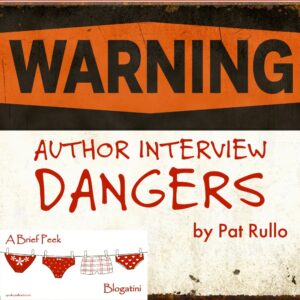Author Interview Dangers by Pat Rullo

While podcasts and radio provide an excellent platform for authors to connect with their audience and share their work, there are a few potential dangers. Here are a few, along with ideas to keep you safe.
Technical difficulties: Issues with audio quality, dropped calls, or internet connectivity problems can disrupt the interview and make it difficult for the conversation to flow smoothly.
Poor chemistry or communication: Sometimes, the host and author may not click well, leading to a lackluster or awkward conversation. This could result in a boring or unengaging episode for the listeners.
Lack of preparation: Interviewers unfamiliar with the author’s work may fail to do adequate research, leading to superficial or repetitive questions. This can result in a missed opportunity for a deeper exploration of the author’s ideas and themes.
Bias or agenda: Sometimes, interviewers may have personal preferences or hidden agendas that influence the nature of the questions or the overall tone of the interview. This can create a skewed or unfair representation of the author or their work.
Pressure and performance anxiety: Authors might feel pressured to say certain things or present themselves in a specific way during an interview. This can lead to anxiety and detract from the authenticity of their responses.
Lack of control: Once the interview is conducted, the author has little control over how it will be edited or presented to the audience. The host or producer may select specific segments, omit crucial information, or present the author’s views in a distorted manner.
Limited time for elaboration: Typically, interviews have limited time slots ranging from a few minutes to half an hour. This time constraint may prevent the author from fully explaining complex ideas or adequately discussing their work, leaving the audience with a superficial understanding. Conversely, long interviews tend to become repetitive, and listeners tune out.
Unexpected or sensitive questions: Hosts may ask unexpected or sensitive questions which the author may be unprepared for or uncomfortable addressing. This can result in awkward responses or potential damage to the author’s image if they struggle to answer effectively.
To navigate these potential dangers, authors can consider the following steps (along with what I do as a podcast/radio host to avoid these pitfalls).
Technical Issues: Ask the host ahead of time about the mechanics of the interview. Will it be video? Audio only? Live? Prerecorded? Ask about the best way to approach any of these formats. I conduct audio interviews; typically, the less equipment we have between us, the better the sound quality. Earbuds and speakerphones often create feedback. We always do a sound check before the recording to ensure the quality is the best.
Thorough Preparation: Authors should prepare for the interview by familiarizing themselves with the podcast’s style, audience, and potential questions. By listening to a few episodes, you will get a good feel for the host’s level of preparation and ability to conduct a quality interview. You’ll know immediately if you’ll be comfortable speaking to this person. I am not a fan of rehearsed questions and answers, but if it makes the author feel better, I’m always happy to send some potential questions ahead of time. I spend a lot of time researching the author before the conversation so I know more about them than just their book. My only agenda as a host is to allow my guests to shine. Read my previous Blogatini post: An Author Interview Is Not About The Book. READ HERE
Communication with the Host: Establish an open line of communication with the podcast host to ensure both parties clearly understand the goals, message, and boundaries. Authors and I email to hone in on any specific focus or questions they want to cover long before the interview.
Decline Controversial Topics: If uncomfortable or unprepared to discuss specific controversial topics, authors should feel empowered to politely decline or redirect the conversation towards subjects they are confident addressing. Sometimes as a conversation unfolds and I consider asking a sensitive question, I always couch that question with permission, such as – is it okay to talk about that childhood incident? If the author enthusiastically agrees, we move forward. If they indicate they would rather not, we move on, and during the editing process, I remove all of that conversation. Sometimes after an interview with a potentially sensitive segment, I ask the author if they want me to remove that section. Editing is my specialty, and the audience is none the wiser.
Follow-up if Needed: If an author feels that a mistake was made or their message was misunderstood during the interview, they can contact the podcast host to clarify any misunderstandings or request corrections. To avoid this after-the-fact issue, I let authors know before the interview that I can edit anything in or out—knowing that upfront adds an extra layer of comfort and safety to the conversation.
Being featured on a podcast can provide valuable promotion and exposure as it reaches a new audience of potential readers, perhaps increasing book sales. The podcast may also feature the author’s biography and links to books, websites, or social media, further driving traffic and engagement.
By being prepared, setting boundaries, and maintaining open communication, authors can mitigate the potential dangers and maximize their author interviews. The value of a quality author interview is priceless and continues to reach potential readers long after the initial airing.
Now that you’re prepared – go ahead – give it a try!
PR
